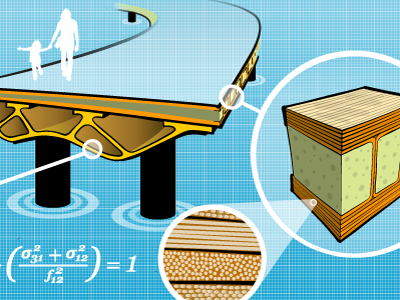Overview
The best crash course on safe-life, fail safe, and damage tolerant design certification principles. Learn methods to assess initiation and propagation of fatigue damage in engineering structures and materials.
Fatigue fractures may occur as a consequence of cyclic loading structures. In particular within the context of fatigue and damage tolerance certification, engineers should have the knowledge and skills to analyse and assess fatigue life and fatigue performance. This includes the ability to design against fatigue, and to validate designs with validated fatigue strength justifications. Fatigue fractures and related structural failures may be caused by a variety of factors, such as quality of applied materials, the production technology, the structural design, inappropriate reliability calculations, underestimations of load spectra, and inappropriate use of structures. With so many possible factors an integral and rigorous engineering approach is required.
This course will provide you with the knowledge and skills to identify potential critical locations and sources of poor fatigue performance; to develop strategies to avoid fatigue fractures and to improve fatigue performance of structures.
The course suits mainly aerospace engineers whose responsibilities include aircraft structures. However civil engineers, structural engineers, as well as engineers working in the manufacturing industry would benefit as well from high level review of fatigue life assessment and damage growth.
For anyone working on development, design or strength justification of engineering structures this course will be invaluable. It will not only cover the methods and best practices, but also explain thoroughly the fundamentals that allow to assess the limits of current practices, and ways to overcome such limitations. In short, you will become a fatigue and damage tolerance specialist!
By the end of this course you will be able to:
- Interpret and discuss the fatigue fracture features with respect to the characteristics of each phase in fatigue life.
- Define and determine stress concentration factors for notched structures with or without residual stresses.
- Explain and discuss S-N curves with respect to mean stress, material surface effects, and scatter, and perform fatigue life analyses considering mean stress and notch root plasticity.
- Assess the fatigue life of tension and shear joints, and explain limitations to the similarity principles.
- Explain Linear Elastic Fracture Mechanics concepts for damage growth, and perform crack growth analyses with these concepts.
- Explain the consequences of variable- and constant amplitude loading on fatigue life and damage growth, and perform fatigue life analyses for arbitrary load spectra.
- Explain the effect of environment on fatigue life and fatigue phenomena.
- Perform residual strength analyses.
Earn a Microcredential with this course
A Microcredential is an additional quality certification for small educational units. It shows what knowledge, competence and experience the participant has gained upon successful completion of the course. A Microcredential is awarded in the form of a digital badge which can be shared and is instantly verifiable.
This certification is awarded to participants who enroll and complete the course starting on September 4, 2023 or later.
More information
Details
Course Syllabus
Week 1: Fatigue phenomena and societal consequences. Understanding the various fatigue fracture phenomena in engineering metallic and composite structures. Definition of fatigue and description of history of fatigue assessment. Principles for designing against fatigue. Fatigue damage initiation and growth mechanisms.
Week 2: introduction to stress concentration factors (SCFs), principles to work with and calculate SCFs and design against stress concentrations. Influence of residual stresses.
Week 3: Assessment of fatigue life, definitions and best practices, discussion of scatter. Discussion of joining in relation to fatigue, aspects like fretting corrosion and pretensioning.
Week 4: Introduction to stress intensity factors (SIFs) and damage growth predictions. Relation between physics of phenomena and stress based methods. Crack growth predictions.
Week 5: Discussion of effect of variable amplitude loading on fatigue life assessment and damage growth predictions. Load spectra measurements and usage monitoring.
Week 6: Fatigue in composites; description of typical fatigue mechanisms and phenomena in relation to best practices for evaluation. Influence of environment.
Week 7: Residual strength analysis and testing in relation to aerospace damage tolerant design certification.
Assignment(s) and Assessment
This course aims to convey the knowledge via online lectures, while quizzes and assignments aim to practice the related skills. Collaboration and discussion with fellow online students are strongly recommended to improve the learning experience: you learn it best by explaining it others.
Student/professionals are expected to complete the following assignments prior to the written examination:
- Assignment 1: Stress concentration factors
- Assignment 2: Fatigue properties and S-N curves
- Assignment 3: Pre-tensioning and fatigue
- Assignment 4: Stress intensity factors
- Assignment 5: Fatigue life under variable amplitude loading
- Assignment 6: Crack growth under variable amplitude loading
- Assignment 7: Residual strength
Date of proctored exam: To be announced.
Date of resit: To be announced.
Literature & Study Materials
- Peterson's Stress Concentration Factors, Walter D. Pilkey, Deborah F. Pilkey, ISBN-13: 978-0470048245 (Amazon.com $143.63).
- J. Schijve, Fatigue of Structures and Materials, 2nd edition, 2009, Springer Science+Business Media, B.V., ISBN-13: 978-1-4020-6807-2 e-ISBN-13: 978-1-4020-6808-9 (online provided by TU Delft Library).
Readers, formative tests, documentation, and other relevant material provided via e-learning platform.
Further reading (optional):
- Elementary engineering fracture mechanics by D. Broek
- The practical use of fracture mechanics by D. Broek
- Handbook for Damage Tolerant Design, by Afgrow
Other Study Material:
Qualifications
Certification
If you successfully complete your online course you will be awarded with a TU Delft certificate and a Microcredential (a digital badge which can be shared and is instantly verifiable).
This certificate will state that you were registered as a non-degree-seeking student at TU Delft and successfully completed the course. The certificate will also indicate the number of ECTS credits this course is equal to (3 ECTS) when this course is taken as part of a degree program at the university.
This course is a MSc course in the Faculty of Aerospace Engineering. If you decide that you would like to apply to the full Master's program in Aerospace Engineering, you will need to go through the admission process as a regular MSc student. If you are admitted, you can then request an exemption for this course that you completed as a non-degree-seeking student. The Board of Examiners will evaluate your request and will decide whether or not you are exempted.
Chartered Engineering Competences
All our online courses and programs have been matched to the competences determined by KIVI’s Competence Structure, a common frame of reference for everyone, across all disciplines, levels and roles.
These competences apply to this course:
- A1: Extend your theoretical knowledge of new and advancing technologies.
Admission
Below, you can find the expected prior knowledge required to participate in this course. Please note that these are provided as indications only. TU Delft will not request proof of this prior knowledge through copies of degrees or diplomas. However, it is your responsibility to ensure that you possess the necessary knowledge, acquired through prior education or relevant work experience.
- A relevant BEng or BSc degree in a subject closely related to the content of the course or specialized program in question, such as aerospace engineering, aeronautical engineering, mechanical engineering, civil engineering or (applied) physics.
- The learning objectives of the following TU Delft courses:
- Level of English equivalent to one of the following certificates:
- TOEFL score 90+ (this is an internet-based test)
- IELTS (academic version) overall Band score of at least 6.5
- University of Cambridge: "Certificate of Proficiency in English" or "Certificate in Advanced English"
Admission process
In order to complete your admission process you will be asked to upload a valid copy of your passport or ID card.
Contact
If you have any questions about this course or the TU Delft online learning environment, please visit our Help & Support page.



